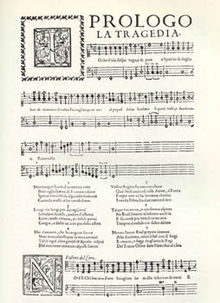Euridice (Peri)
| Euridice | |
|---|---|
| Opera by | |

The Prologue, from the score published in Florence in 1600
|
|
| Librettist | Ottavio Rinuccini |
| Language | Italian |
| Based on | Ovid's Metamorphoses |
| Premiere | 6 October 1600 Palazzo Pitti, Florence |
Euridice (also Erudice or Eurydice) is an opera by Jacopo Peri, with additional music by Giulio Caccini. It is the earliest surviving opera, Peri's earlier Dafne being lost. (Caccini wrote his own "Euridice" even as he supplied music to Peri's opera, published this version before Peri's was performed, in 1600, and got it staged two years later.) The libretto by Ottavio Rinuccini is based on books X and XI of Ovid's Metamorphoses which recount the story of the legendary musician Orpheus and his wife Euridice.
The opera was first performed in Florence on 6 October 1600 at the Palazzo Pitti with Peri himself singing the role of Orfeo.
Euridice was created for the marriage of King Henry IV of France and Maria de Medici. The composition is typically considered to be the second work of modern opera, and the first such musical drama to survive to the present day. (The first, Dafne, was written by the same authors in 1597.)
Since both the libretto and score were dedicated to the new Queen of France, Marie de' Medici, some scholars have recognized a possible parallel between Euridice and Orfeo and the Queen and King of France. While the comparison is readily made, some scholars argue that the traits of King Henry IV are different from Orfeo, especially with respect to Orfeo's most famous deed. Orfeo loved Euridice so much that he journeyed to Hell and back, quite literally, to unite once more with his beloved wife while King Henry IV wouldn't travel as far as Florence to retrieve Medici.
At the premiere, many of the other roles were filled by members of Caccini's entourage, including his daughter Francesca Caccini. Peri composed all of the music for the first production, but owing to the integral involvement of Caccini and his performers, some of Peri's music was finally replaced by that of Caccini. When Caccini discovered that Peri intended to publish the opera with the added Caccini pieces, he rushed to finish his own version of Euridice using the same libretto, and managed to have his published before Peri's. In his preface, Peri notes that all of the music was completed by the date of the first performance earning his efforts the designation Prima Euridice.
...
Wikipedia
